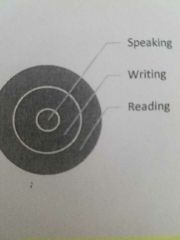![]()
![]()
![]()
Use LEFT and RIGHT arrow keys to navigate between flashcards;
Use UP and DOWN arrow keys to flip the card;
H to show hint;
A reads text to speech;
22 Cards in this Set
- Front
- Back
- 3rd side (hint)
|
Identify the dates and the names of the three periods of English language development |
-Old English (Anglo Saxon English) 449-1150 -Middle English (Medieval English) 1150-1500 -Modern English 1500-Present |
449-present. |
|
|
Who were the Celts/Britons? |
Peaceful fishermen, invaded and conquered by Romans under rule of Julius Caesar. |
|
|
|
How long were the Celts/Britons under control? |
3.5 centuries |
|
|
|
Who assisted the Celts in driving out the invading Picts and Scots? |
The Nomadic Jutes, Angles and Saxons assisted in driving out the invading Picts and Scots. |
|
|
|
What happened to the Celts after the invasion was stopped? |
The Celts were expelled to Wales and Scotland. |
|
|
|
List three characteristics of Old English/Anglo - Saxon English |
-Had a large vocabulary -Spelling was phonetic (words spelt as they sounded) -Anglo Saxons literature was the majority of time oral literature whose purpose was to entertain |
|
|
|
How did Christian missionaries expand the old English language? |
They did so by introducing Latin words related to the church and cultural life. |
|
|
|
What was the major purpose of Anglo-Saxon literature? |
It's major purpose was to entertain |
|
|
|
Identify the only surviving literature of the Anglo-Saxon era. |
The only surviving full length epic was "Beowulf". |
|
|
|
Identify the languages that combined to create Middle/Midieval English. |
French and Old English were combined to create Midieval (middle) English. |
|
|
|
Middle/Midieval English was a "shared experience". Explain. |
Literature was a "shared experience" as people worked, ate, and lived together in a Noble's castle or monastery. |
|
|
|
Identify the most famous literature of the Midieval period. |
The Canterbury tales. |
|
|
|
What role did William Claxton play in the modern English period? |
1477, William Claxton was the first to print a book in England while also using a print press. |
|
|
|
Identify the dialect chosen to standardize the English language. |
The majority of people spoke East Midland dialect, therefore it was chosen as the main dialect used when printing. |
|
|
|
Identify the four types of literature that developed during the Modern English era. |
-Introduction to the Sonnet -Plays, theater -Interludes (short plays between courses of a banquet) -Invention of the blank Verse (unrhymed iambic pentameter) |
|
|
|
Who is Samuel Johnston and why is he important? |
He created the first dictionary containing all the words of the language (only lists gathered by locals up to this time) |
|
|
|
How did King James affect the English language? |
- Simplistic language of 6000 words was ordered. - Avoidance of foreign words and expressions. - First dictionary to contain symbols and imagery. |
|
|
|
List any five words borrowed from other languages that are part of our current English Language. |
Sol - Solar Opticus - Optical Urbs - Urbans Spanish/Portuguese: rodeo, cigar, cargo Greek: crisis, thesis, criterion, Russian: vodka. |
|
|
|
List the three vocabularies every individual possesses. |

1. Speaking habitual words. 2. Writing-more thought involved words. 3. Reading/recognition - largest number (what you understand). |
|
|
|
List the five levels of the English language. |
1. Literary: formal English 2. Colloquial: informal, spoken, 3. Slang: unauthorized, inelegant 4. Idioms: words peculiar to a region 5. Vulgarisms: language used by the poorly educated |
|
|
|
What two levels of language do most people use? |
Most people us colloquial and slang, since that is in the middle. Depends if they have idioms, not socially accepted to use vulgarisms or speak literary since those are extreme ends. |
|
|
|
When and who developed the first printing press? |
Approx 1440 German goldsmith Johannes Gutenberg developed a movable type and the earliest printing press. |
|

